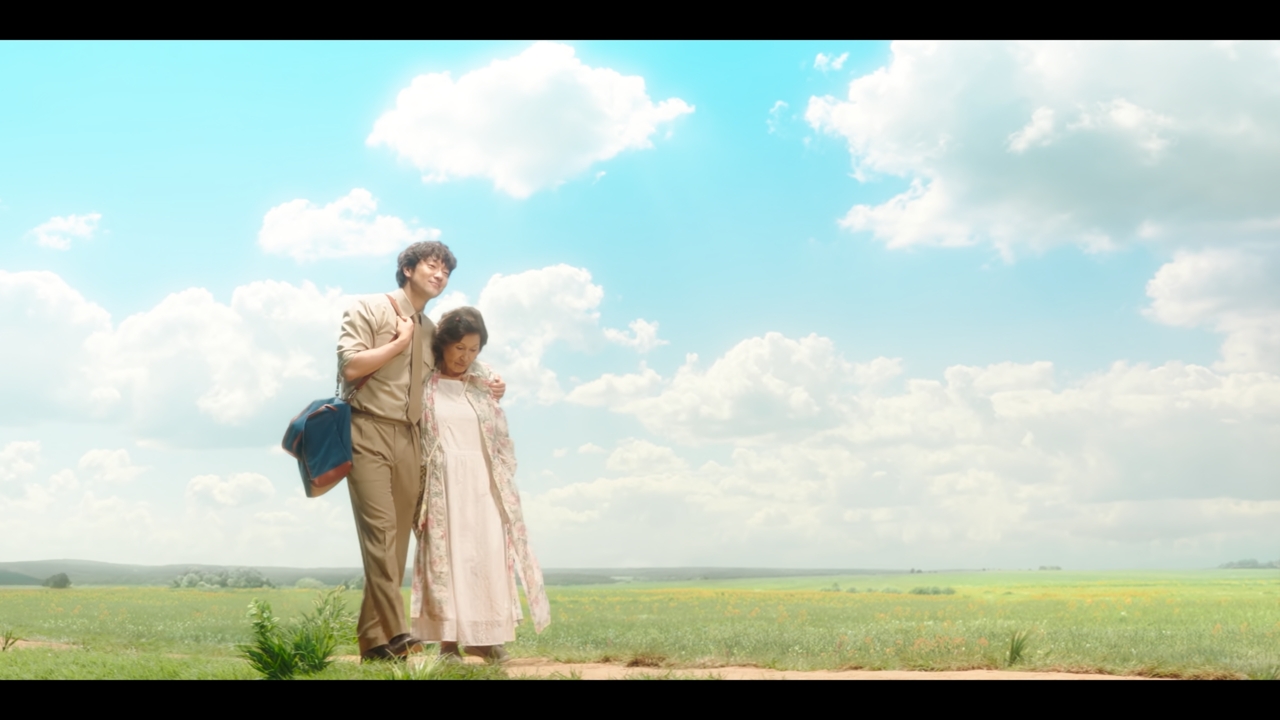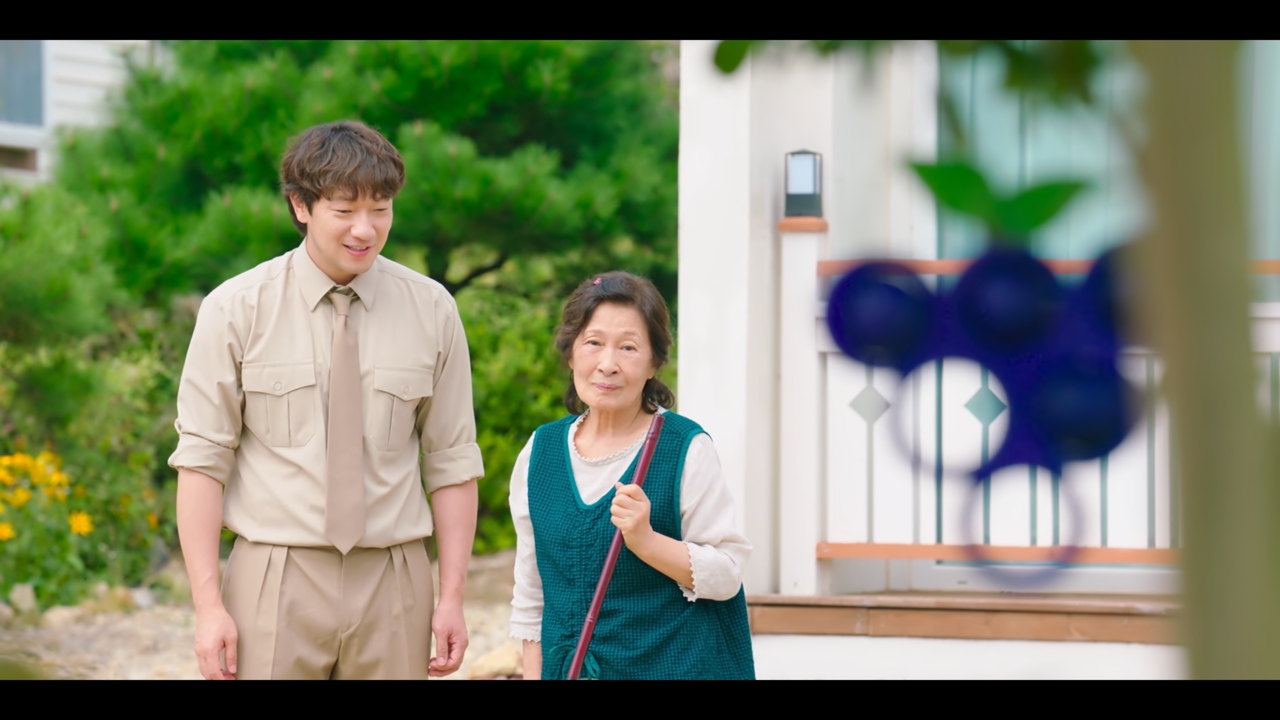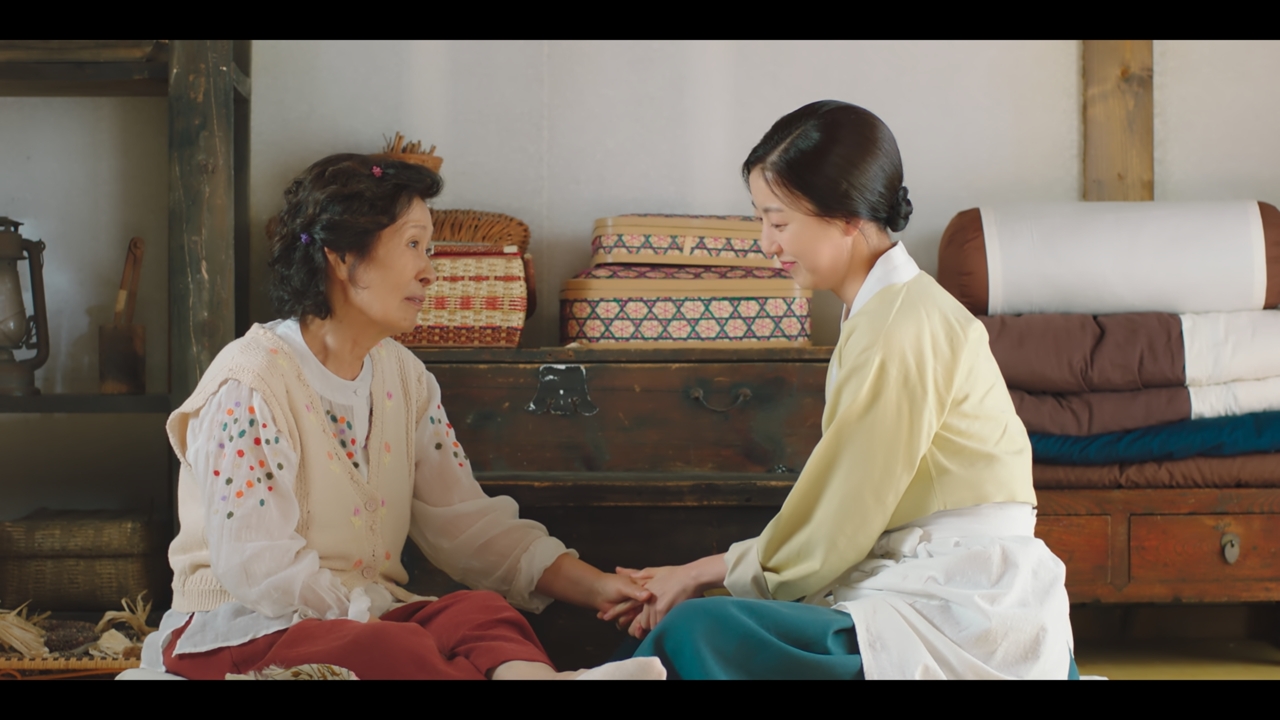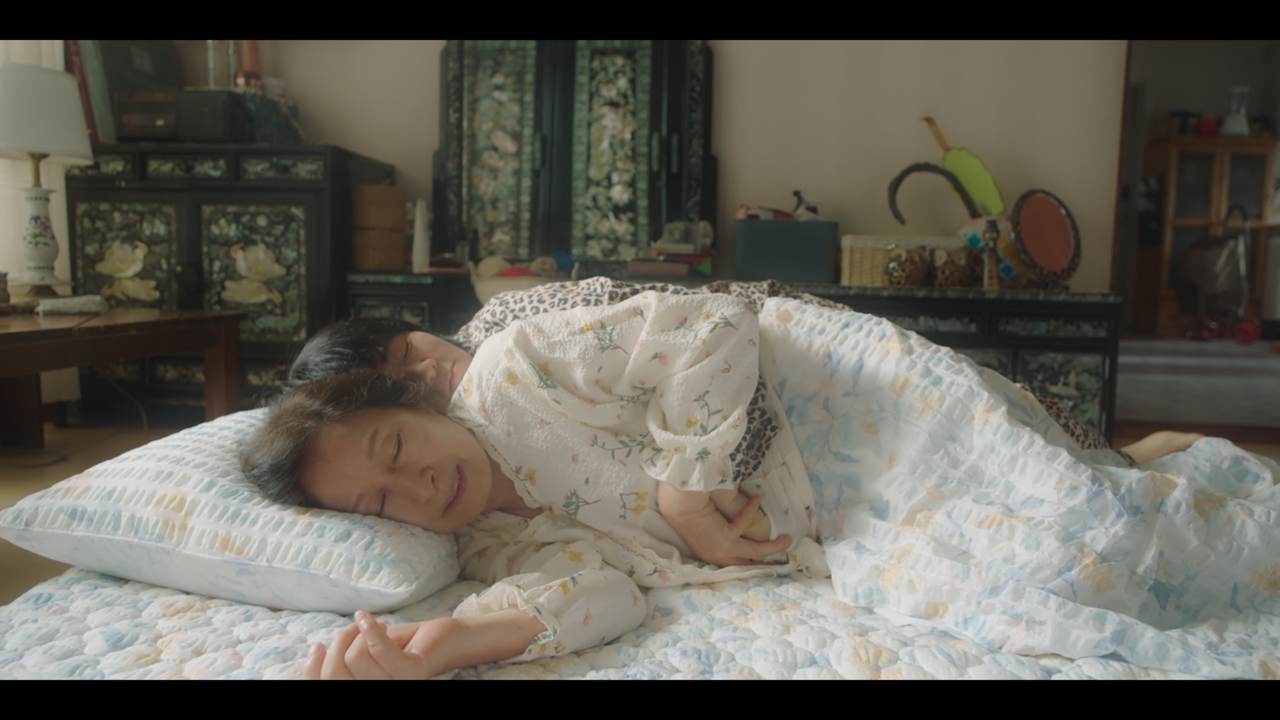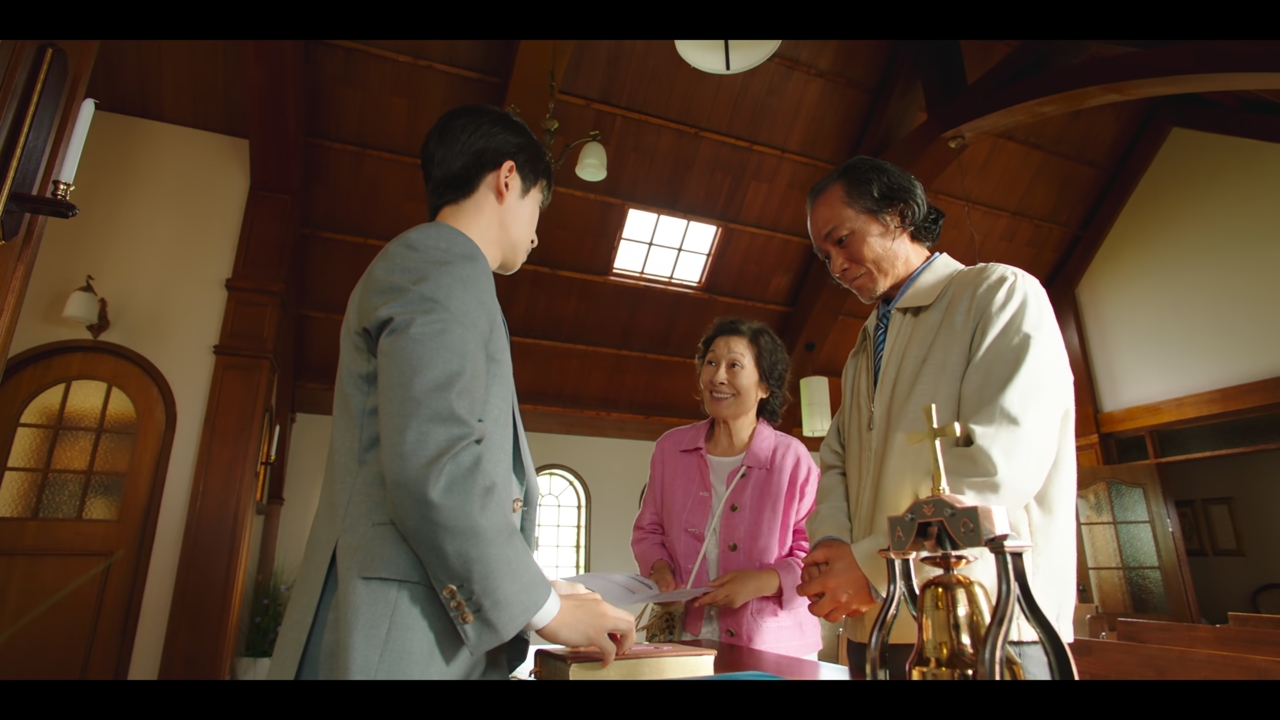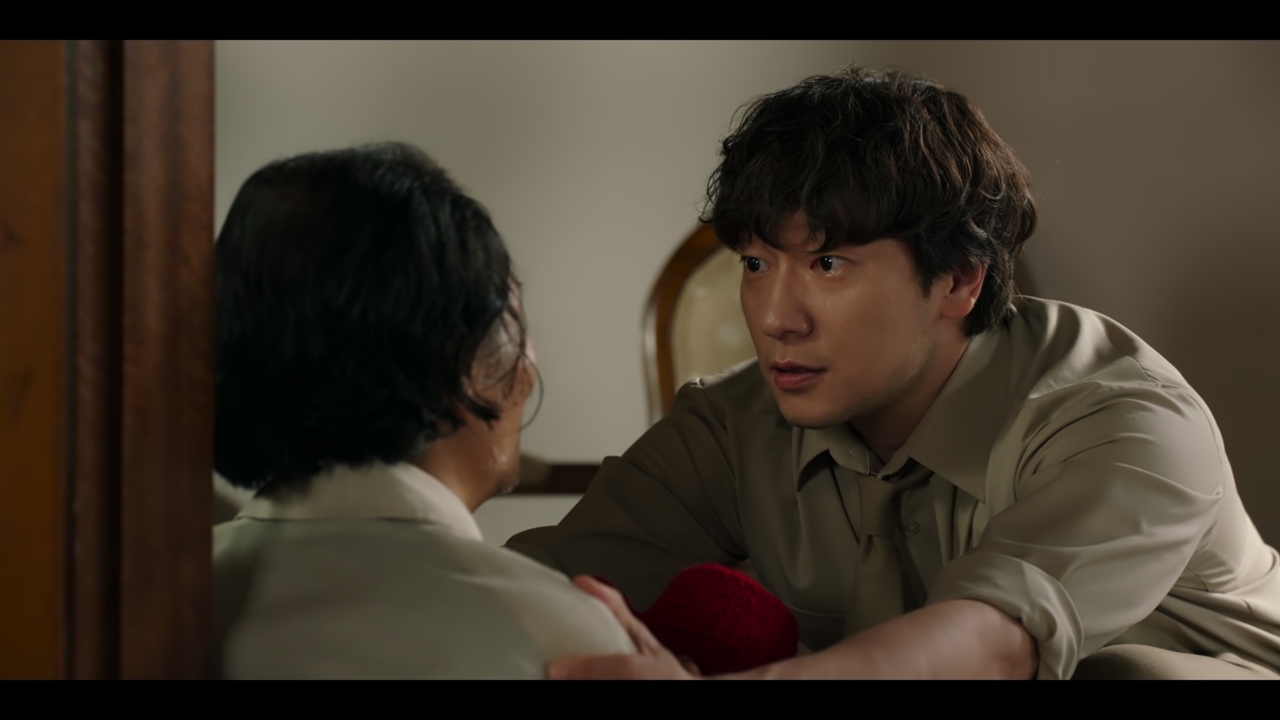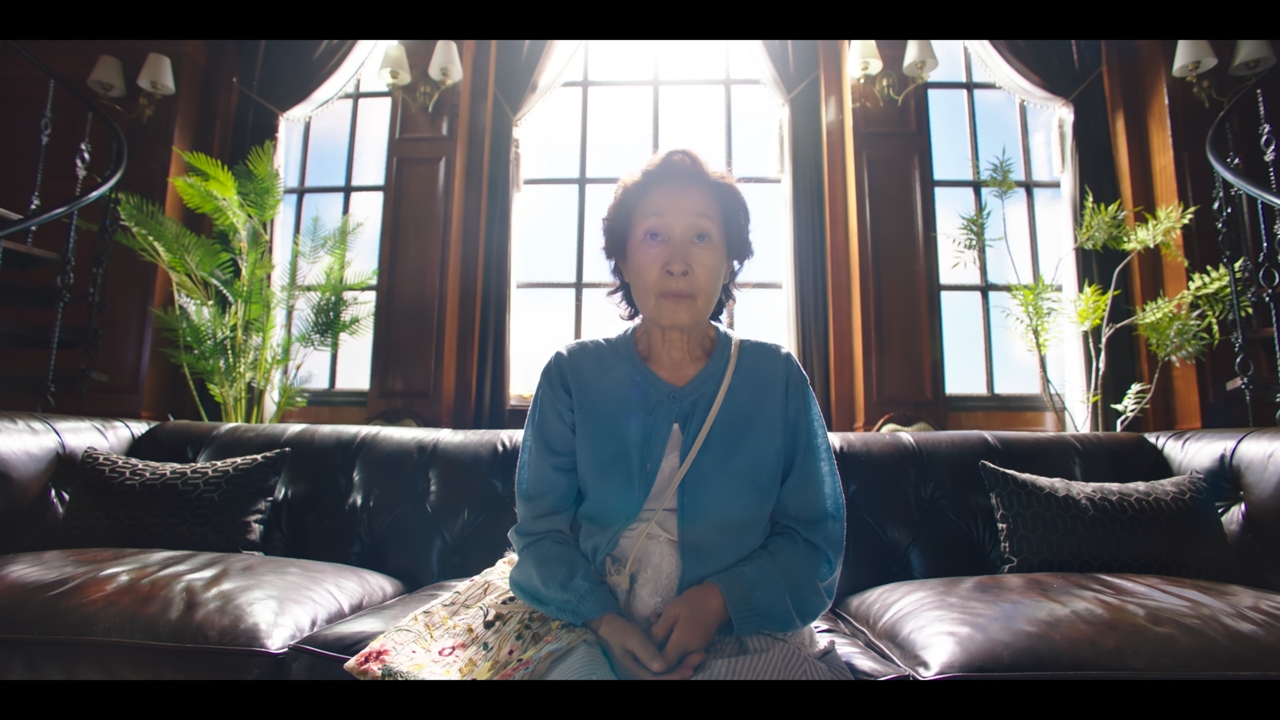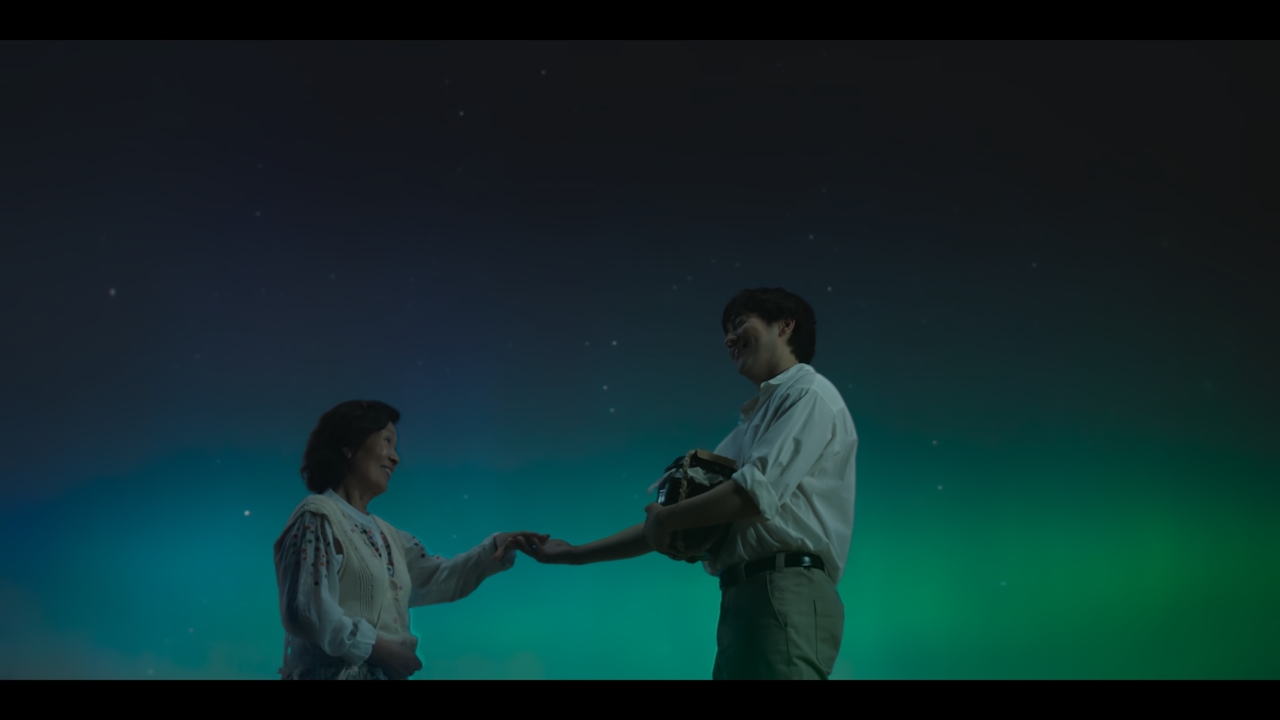Heavenly Ever After: Episodes 3-4 » Dramabeans
Heavenly Ever After: Episodes 3-4
by lovepark
Heaven proves to be more challenging than our older heroine expected as she adjusts to her new home and the rules that come with it. Despite having her dreams fulfilled, paradise has not been exactly perfect, and our odd couple will soon realize that happiness takes effort and love is a choice.
EPISODES 3-4
The last day of orientation for our newly deceased heroine involves letting go of sadness, and the process begins in the memory room. With the help of heavenly technology, Hae-sook reviews her life from when she was a young girl looking for her dead mom to a young woman meeting a cute man in the streets, willing to race a bus to sweep her off her feet. Then tragedy hits when her husband gets into an accident, and the snippets from opening week play in quick succession until Hae-sook returns to the present with tears in her eyes.
With her past fresh in her mind, she softens at Nak-jun who charms her with the same line he said all those years ago, and he takes her to the rainbow bridge that pets use to cross into heaven. He wants her to be happy for her own sake and not for anyone else, but his sweet words take on a different meaning when they find a strange woman waiting for him at their house. Hae-sook feels threatened by the young woman clinging to her husband, and his explanation of their relationship only worsens her mood. (She caught his eye while he rode the subway for work, and without thinking, he stopped her from going to hell.)
As her opinion of Nak-jun and heaven, in general, reaches rock bottom, Hae-sook finds four grapes in the yard containing clips of her “misdeeds.” Her husband giddily explains their purpose – a tracking system to punish the undeserving – and he finally gasps when he realizes that his wife might end up in hell if she receives two more grapes. Hae-sook sniffs at the stingy number, but according to the nervous worker who comes to explain the next steps, no one has gotten as many grapes as her in centuries.
In order to stay in heaven, Hae-sook must attend reformation classes, but given her old age, the center president offers an alternative activity – which has nothing to with the letter about the other participants being afraid of her (ha!). Thus, our non-believing heroine ends up attending church services and the pastor (Ryu Deok-hwan) is more than a little disappointed that his only congregation member is an old lady with four grapes. They immediately bicker over the silliest questions, and Hae-sook falls asleep in the pews after the pastor finishes the first sentence in his dry sermon.
After an exasperating day at church, Hae-sook comes home expecting some peace only to learn that the strange woman is still here. Nak-jun even named her Som-yi (like cotton because she’s pure), and Hae-sook is fed up with feeling like an idiot. She tells her husband that he clearly no longer needs her and that it was selfish of her to think that he should match her current lifestyle out of obligation. Since he does not love her as who she is now, Hae-sook decides to find someone who will.
At the community center, Hae-sook looks for her mom, but protocol prohibits workers from releasing personal information without consent. Cracking her knuckles, Hae-sook reminds the worker that she has four grapes and those in heaven can feel pain, but before she lands herself another grape for threatening others, the center president intervenes. He lets the rules slide this once for Hae-sook and helps her find her mom who is living in a past heaven. Watching over her, the president lights the way as she boards a bus and then walks through a field to a small house on a hill.
Hae-sook instantly recognizes the young woman stepping out of the house, and as she calls her mom, the other person tears up, too, in recognition. She dotes on her little girl, making her food and a place to stay for the night, but when they get down for bed, her mom tells her a story about the past. When she was married, her husband brought home a new woman who soon gave birth to a girl. Her mom took care of the child as her own until one day, the husband and his new woman died in a train accident.
Hae-sook wonders who the other child is since she never grew up with siblings, and her mom smiles painfully as her daughter puts the clues together. She tells Hae-sook that she was innocent in all of this, but she had to leave her behind in order to not resent her for tying her to that miserable past. However, even after she left, she couldn’t forget Hae-sook and secretly attended her graduation and wedding.
In the morning, Hae-sook recalls her mom’s tale about fate being stronger than blood, so when she sees Nak-jun waiting in the yard to pick her up, she gives him another chance. While Hae-sook was out, Nak-jun went to work delivering the messages of the living to the dead and crossed paths with the center president who reminded him of why he chose this profession in the first place. During the year between their deaths, Nak-jun watched over Hae-sook whenever he was in the living world to pick up letters, and the president’s gentle nudge made him realize that all he ever wanted was his wife.
Mending her relationship with Nak-jun, Hae-sook accepts Som-yi as a temporary guest and sets out side dishes for her to eat. As Hae-sook starts to treat her more kindly, Som-yi enters her room one night after having a nightmare of being dragged to hell and cuddles next to Hae-sook with her hand in her pocket. The behavior reminds Hae-sook of Young-ae, and she starts to reconsider all the little coincidences that suggest the impossible.
Since Som-yi has no memories as a result of Nak-jun’s meddling, Hae-sook asks the community center worker about Young-ae to check her theory. The worker informs her that Young-ae is dead, but her address is unknown. This could mean a number of things, but Hae-sook chooses to believe that Som-yi is Young-ae. Nak-jun, on the other hand, is a bit more skeptical about the amnesiac, hell-bound stranger actually being their adopted daughter and warns Som-yi not to hurt his wife with her lies.
Complicating the situation, another hell escapee is on the loose, and the three stray dogs from episode two are determined to find the runaway first. Their goal is to punish all animal abusers, but since they are in heaven, they have no way of finding out if humans are being appropriately punished for their crimes. Hence, they hope the runaway can teach them how to get to hell, and from the bits and pieces they pick up, their snouts point them towards Som-yi who smells different from everyone else.
As Hae-sook continues her community-ordered church services, a new member joins the congregation, and the pastor is thrilled to welcome a true believer unlike a certain someone who treats his sermons as lullabies. The new member, though, always comes drenched, and we soon learn why. While everyone competes over who has the saddest backstory (Hae-sook lost her parents and had to take care of her husband; the pastor was an orphan and never left the church in hopes that his mom would come find him), the new member shares his, as well.
When he was alive, he lived with his wife who seemed to be suffering from dementia. Then one day, he learned that he had stage four colon cancer, and since he had no one to look after his wife, he drove them both into the ocean. Now that they’re dead, all he wants is to know if his wife made it to heaven, and then he will return to hell. That last statement catches the others off guard, and Hae-sook’s sympathies turn to fear as the new member takes out a knife and holds her hostage.
The center president and his workers surround the church along with two messengers from hell, and they order the runaway to turn himself in. He demands to know where his wife is, but the president firmly tells him that he may not have that privilege. The president believes that everyone has a right to their lives, so while the runaway taking his own is not a sin, making that decision for his wife without her consent is. He gives the runaway one last chance to return to hell, otherwise his existence will be erased as well as his chance at reincarnation.
As both sides are caught in a standstill, Nak-jun arrives with a message for the runaway. He holds out a scarf that the wife wanted to pass along to him and convinces the other man to go back to hell, secretly letting him know that his wife is in heaven. Thanks to Nak-jun’s kindness, the man leaves of his own volition, and Hae-sook returns home with her husband safe and sound. At their house, they find Som-yi cowering in the closet, but when Hae-sook calls her Young-ae, the scene switches to the real Young-ae walking in a crowd towards hell.
So many questions! First, who is Som-yi? Like Nak-jun, I doubt she is Young-ae, and the last scene seems to confirm that she is not. However, there are so many little details that suggest that she isn’t a complete stranger, either. Besides her identity, her entire existence, similarly to Hae-sook’s, adds a lot of interesting complexities to the world because her differences shape how she views heaven. She sees rain clouds in the sky where others do not, and nightmares of hell plague her whenever she closes her eyes. She is a “mistake” who doesn’t belong, but unlike Hae-sook who feels out of place because of her memories, Som-yi feels detached to the world because of her lack of them. It reminds me of the conversation the president had with the dogs about hell being a state of mind, and it makes me wonder if their heaven is not called “paradise” because of this very reason. Everyone who has died carries sadness, guilt, regret, which is what keeps them from being completely happy as the orientation claims, but is purging these emotions truly the solution to reach a perfect world or would it just lead to empty husks like Som-yi who live in fear?
With each passing episode, the world and its lore deepens in clever and creative ways. I really liked how there are multiple heavens in different histories because time isn’t linear there since nothing really ages or moves forward in the typical sense. It’s probably why heaven lets you choose your age upon entry (the past, present, and future coexist), but as a consequence, this may be why they don’t allow changes afterwards since there’s a static nature to the world that deliberately kicks out those who disrupt it. I also found Nak-jun’s work interesting as well as his interactions with the living world. Not only could he stop Som-yi from going to hell, but he can speak with the living, both accidentally and purposefully. He’s clearly doing some unsanctioned sleuthing on the side, and for someone as meddlesome as him, I doubt it’ll end with a conversation or two.
While it was a brief glimpse, I loved how Hae-sook and Nak-jun first met. He’s an adorable rascal with a charming smile, and his utter devotion to Hae-sook from the moment he laid eyes on her was exactly the type of love and affection she needed. He expresses his emotions shamelessly (past and present), and it’s easy to see why she fell in love and keeps falling in love with him after every bump in the road. They make such a cute, odd couple, and somehow both actors have convinced me that Hae-sook and Nak-jun are simply meant to be no matter their physical appearances.
It also helps that the show is genuinely humorous, and the latest addition of the pastor has been an absolute riot. His banter with Hae-sook is great because neither side wants to lose whatever inane argument they stumble upon, and their constant back and forth makes Hae-sook feel lively and not her years because the pastor doesn’t treat her like some delicate lady who might die. This is heaven, and while Hae-sook might look old, it doesn’t represent the same things in a world where most people have been her age, too. Appearances, to a certain extent, don’t (or shouldn’t) matter, and I love how this message is shown through their relationship in a contrasting manner from the romantic one she has with Nak-jun. Also, the pastor giving his sermons to put Hae-sook to sleep so he can do errands will always make me chuckle.
RELATED POSTS

